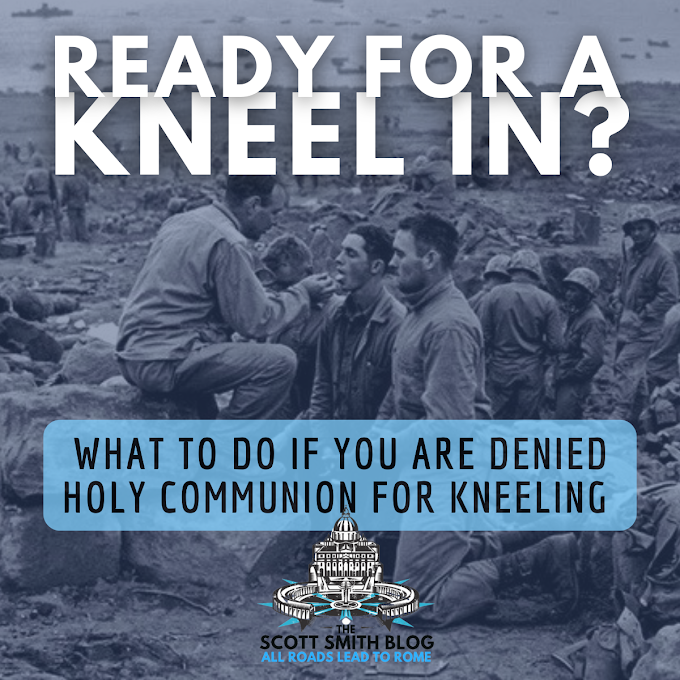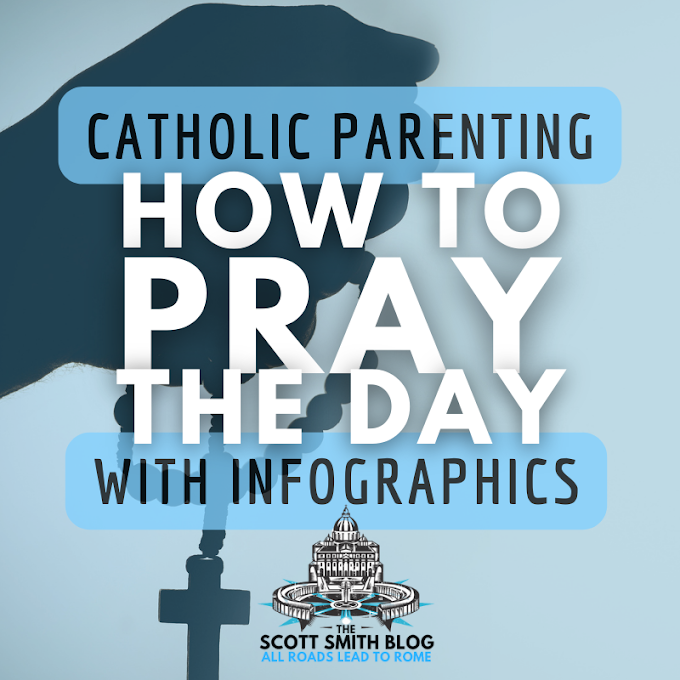Thinking about what to give up for Lent? Wondering why we fast during the season of Lent? Why do Catholics (1) pray, (2) fast, and (3) give alms during Lent? What is traditional Catholic fasting and where does this tradition come from?
Also, did you know prayer, fasting, and almsgiving directly correlates to Jesus' three temptations in the Desert?
The basis for all this will amaze you!
"Give alms...Pray to your Father...Fast without a gloomy face..." (Matthew 6:1-18)
So why do Catholics (1) pray, (2) fast, and (3) give alms during Lent?
I think, if asked, most savvy Catholics would be able say something along the lines of "well, it comes right out of the Bible." Maybe not chapter and verse - specifically, Matthew 6:1-18 as provided above. I think most Catholics realize the tradition is rooted in Scripture.
But there's SO MUCH MORE to it!
These three practices - prayer, fasting, and almsgiving - are hidden throughout Scripture.
They correspond to the three temptations Christ experienced in his 40 days in the desert, and ...
They correspond to the three temptations Eve experienced in the Garden of Eden, and ...
They correspond to Jesus' second round of temptations, which occur in the Garden of Gethesemane ...
They are everywhere! But why?
Introduction: Dr. Brant Pitre and the Biblical Roots of Ash Wednesday and Lent
Dr. Brant Pitre provides a great overview of the connections embedded throughout Scripture to prayer, fasting, and almsgiving:
The Three Kinds of Sin & The Three Remedies to Sin
Here's the bottom line: The three temptations experienced by both Christ and Eve are called the "Threefold Lusts" and the three Lenten practices are the REMEDY to these lusts or temptations. The "Threefold Lusts" are described in the First Letter of St. John:
"For all that is in the world, the lust of the flesh and the lust of the eyes and the pride of life, is not of the Father but is of the world." (1 John 2:16 RSV-CE)
So, here are the Three Lusts (or Three Concupiscences):
- Lust of the Flesh -- the desire which comes from our bodies, such as for food, sexual gratification, sleep, etc.
- Lust of the Eyes -- the desire to possess what we see, such as money, objects, the flesh of another, etc.
- Pride of Life -- the desire for power, esteem, false glory, etc.
But why do these three affect us so deeply? Why are we so vulnerable to these three specific attacks from the Devil? Why this pattern?
Original Sin & The Connection to Prayer, Fasting, and Almsgiving
Because it's the same pattern of attack the Devil took against our first parents to bring about the first sin: Original Sin.
Compare the Three Lusts above with the following verse from Genesis:
"So when the woman saw that the tree was (1) good for food, and that it was a (2) delight to the eyes, and that the tree was to be (3) desired to make one wise, she took of its fruit and ate; and she also gave some to her husband, and he ate." (Genesis 3:6)
Isn't that amazing? They are right there in text.
Before we start blaming Eve ...
Adam was at her side the entire time. The devil was bearing down on Eve in the form of a serpent, but not just any serpent. The Hebrew word is nahash, which translates to Greek as leviathan. This a huge, monstrous dragon, not some benign garter snake, and Eve was a damsel in distress.
>> You can read more about the dragon of Genesis here in this article.
And where was Adam when all this was taking place? Adam's position is provided by the Hebrew word imo in the account, which translates as "at her elbow."
This should be a lesson to all men...
Not only did Adam also succumb to the Three Lusts in eating the fruit, but he also succumbed to another sin: cowardice in not defending Woman.
The Fourth Sacrifice of Lent for Men
Therefore, we see with men, even today, a fourth component to Satan's attack. I would recommend for men, therefore, a fourth component to their Lenten observance: abstaining from pornography or other forms of degrading and objectifying women.
Bringing it full circle: How does Jesus respond to the Threefold Lusts in his 40 Days in the Desert?
How does Jesus Conquer the Threefold Lusts in his 40 Days in the Desert?
This is also why Lent is 40 days, right?
We are following Christ into the desert for a period of purification: purification from sin. Of course, Jesus went into the desert, not to purify himself of sin, for he was sinless, but to throw down the Devil.
Let's go through the Gospel account verse-by-verse:
(1) Lust of the Flesh
FASTING: "Then Jesus was led up by the Spirit into the wilderness to be tempted by the devil. And he fasted forty days and forty nights, and afterward he was hungry." (Matthew 4:1-2)
TEMPTATION: "The tempter came and said to him, 'If you are the Son of God, command these stones to become loaves of bread.'" (Matthew 4:3)
RESPONSE: "But [Jesus] answered, 'It is written, 'Man shall not live by bread alone, but by every word that proceeds from the mouth of God.'" (Matthew 4:4)
(2) Lust of the Eyes
The Devil takes Christ to the most visible place on the planet to the Jewish people: the "pinnacle of the Temple." Here, the Devil tells Jesus to perform a miracle, so that all may see it. If Jesus did this, he would be acclaimed as Messiah and what? Jesus wouldn't have to die on the cross. The cross is the most awful sight to the Devil.
TEMPTATION: "Then the devil took him to the holy city, and set him on the pinnacle of the temple, and said to him, 'If you are the Son of God, throw yourself down; for it is written, 'He will give his angels charge of you,' and 'On their hands they will bear you up, lest you strike your foot against a stone.'" (Matthew 4:5-6)
RESPONSE: "Jesus said to him, 'Again it is written, 'You shall not tempt the Lord your God.'" (Matthew 4:7)
What is the Devil quoting above? It's Psalm 91, which just happens to be an ancient exorcism Psalm! I wonder where Satan has heard this verse before?
Also, the Devil skips the next verse: "You will tread on the lion and the adder, the young lion and the serpent you will trample under foot." Jesus is about to trample the serpent under his foot, as was prophesied in Genesis 3:15, the Messiah will crush the serpent's head. Satan doesn't like this too much.
>> To read more about Genesis 3:15, the Proto-Evangelium or "First Gospel", and the prophesy of Christ killing the serpent and the Passion and Death of Christ, check out this article:
(3) Pride of Life
TEMPTATION: "Again, the devil took him to a very high mountain, and showed him all the kingdoms of the world and the glory of them; and he said to him, 'All these I will give you, if you will fall down and worship me.'" (Matthew 4:8-9)
What is Christ's mission? To restore all the nations and kingdoms of the world to His Father. BUT, if Jesus just bows down to the Devil, Satan will just give him the world, and there will be no need to die on the Cross.
RESPONSE: "Then Jesus said to him, 'Begone, Satan! for it is written, 'You shall worship the Lord your God and him only shall you serve.'" (Matthew 4:10)
RECAP: Why Do We (1) Pray, (2) Fast, and (3) Give Alms?
Here is a breakdown of how prayer, fasting, and almsgiving defeats the Threefold Lusts:
(1) Pray: We pray to defeat the Pride of Life: "Fall Down and Worship"
Pride of Life was the "desire to make one wise". This is the desire to be wise like God. In short, to be gods ourselves, instead of bowing to God. That's why we pray. We pray to humble ourselves before God and hear God's wisdom, not to desire our own.
(2) Fast: We fast to defeat the Lust of the Flesh: "Man does not Live by Bread Alone"
If you fall prey to the deadly sin of gluttony, fast from food. If you fall prey to the deadly sin of sloth, fast from sleep or idleness or entertainment. Break the chains of all that binds you, so that you're entirely dependent on Christ, alone.
(3) Give Alms: We give alms to defeat the Lust of the Eyes: "The Pinnacle of the Temple"
We experience the Lust of the Eyes any time we are dazzled by sights - like money/gold/treasure, pornography, our image in a mirror - that provoke Greed, Lust, Vanity, etc.
"Turn your eyes upon Jesus." When tempted by "pleasing" sights, turn your eyes to the Cross.
We give away money to the poor, because (a) giving away money teaches us not to worship it, and (b) to help those in need. Whatever it is that you worship, practice giving it away during Lent. If it's money, give it away. If it's nice clothes, give them to a charity, like St. Vincent de Paul, and clothe a poor person. If it's electronics or social media, turn them off. Turn off your iPhone for family time.
I hope this helps you dig deeper into your Lent! I hope we can all learn the joy of giving away our pleasures.
God bless!
















7 Comments
Secondly, Adam was not necessarily with Eve while she was being tempted. Certainly Adam had to be there when she induced him to eat (so the fact he was "at the elbow" does not resolve this question). Irenaeus says that Eve was alone when the devil tempted her. Chrysostom holds to the same view (e.g homiles on Matthew xii). The idea Adam needed to defend Eve etc is Scott Hahn's peculiar take on it which doesn't seem to have any basis in tradition. At best it is debatable.
Great article though; I'm just picking on what I think are some loose parts ;)